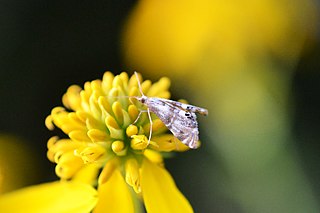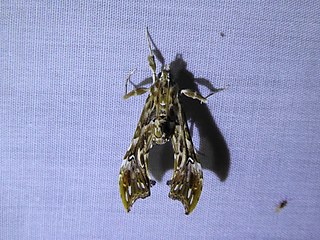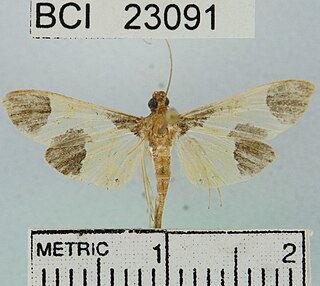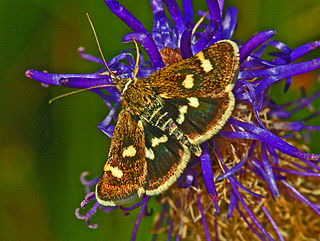
The Crambidae are the grass moth family of lepidopterans. They are variable in appearance, the nominal subfamily Crambinae taking up closely folded postures on grass stems where they are inconspicuous, while other subfamilies include brightly coloured and patterned insects which rest in wing-spread attitudes.

Randall Patrick Munroe is an American cartoonist, author, and engineer best known as the creator of the award-winning webcomic xkcd. With a background in physics and robotics, Munroe has worked full- time on the comic since late 2006, publishing three times a week to a very large audience. Several of the strips, notably a visualisation of radioactivity levels, were also republished by other outlets. In addition to publishing a book of the webcomic's strips, he has written three books: What If?, Thing Explainer, and How To.

xkcd, sometimes styled XKCD, is a webcomic created in 2005 by American author Randall Munroe. The comic's tagline describes it as "A webcomic of romance, sarcasm, math, and language". Munroe states on the comic's website that the name of the comic is not an initialism, but "just a word with no phonetic pronunciation".

Gesneria is a genus of moths of the family Crambidae.

Midila is a genus of moths of the family Crambidae.
Mimophobetron is a monotypic moth genus of the family Crambidae described by Eugene G. Munroe in 1950. It contains only one species, Mimophobetron pyropsalis, described by George Hampson in 1904, which is found in Central America, the Bahamas and Florida.

Udea is a genus of snout moths in the subfamily Spilomelinae of the family Crambidae. The genus was erected by Achille Guenée in 1845. The currently known 214 species are present on all continents except Antarctica. About 41 species are native to Hawaii.

Petrophila is a genus of moths of the family Crambidae. The genus was described by Lansdown Guilding in 1830.

Rhectosemia is a genus of moths of the family Crambidae described by Julius Lederer in 1863.

Syllepis is a genus of moths of the family Crambidae described by Felipe Poey in 1832.

Scoparia is a grass moth genus of subfamily Scopariinae. Some authors have assigned the synonymous taxon Sineudonia to the snout moth family (Pyralidae), where all grass moths were once also included, but this seems to be in error.

Thliptoceras is a genus of moths of the family Crambidae. The genus was erected by William Warren in 1890.

Eudonia echo is a moth of the family Crambidae described by Harrison Gray Dyar Jr. in 1929. It is found in western North America from British Columbia to California.

Dioryctria is a genus of snout moths. It was described by Philipp Christoph Zeller in 1846.

Gesneria centuriella is a species of moth in the family Crambidae described by Michael Denis and Ignaz Schiffermüller in 1775. It is found from Europe, east to Japan. It is also present in Greenland and northern North America.

Odontiinae is a subfamily of moths of the family Crambidae. The subfamily was described by Achille Guenée in 1854.
Glaphyriinae is a subfamily of the lepidopteran family Crambidae. It was described by William Trowbridge Merrifield Forbes in 1923

Scopariinae is a subfamily of the lepidopteran family Crambidae. The subfamily was described by Achille Guenée in 1854.

Eudonia vivida is a moth in the family Crambidae. It was described by Eugene G. Munroe in 1972. It is found in North America, where it has been recorded from Alberta, British Columbia, Maine, New Hampshire, Nova Scotia and Quebec.

Udea itysalis is a moth in the family Crambidae. It was described by Francis Walker in 1859. It is found in North America, where it has been recorded from British Columbia to Quebec, south to Colorado, California, Nevada and Arizona. It has also been recorded from the Sayan Mountains in Russia.
















